- Overview of Candidate Assessment Tests
- Using Personality Tests
- Technical Skills Testing
- Communication Tests
- Using Generative AI in Assessments
- 7 Must-Know Tips To Improve Candidate Assessment
- 11 Hacks For Assessing Candidates
- Frequently Asked Questions
Assessing Candidates: 19 Must-Know Hacks For Recruiters
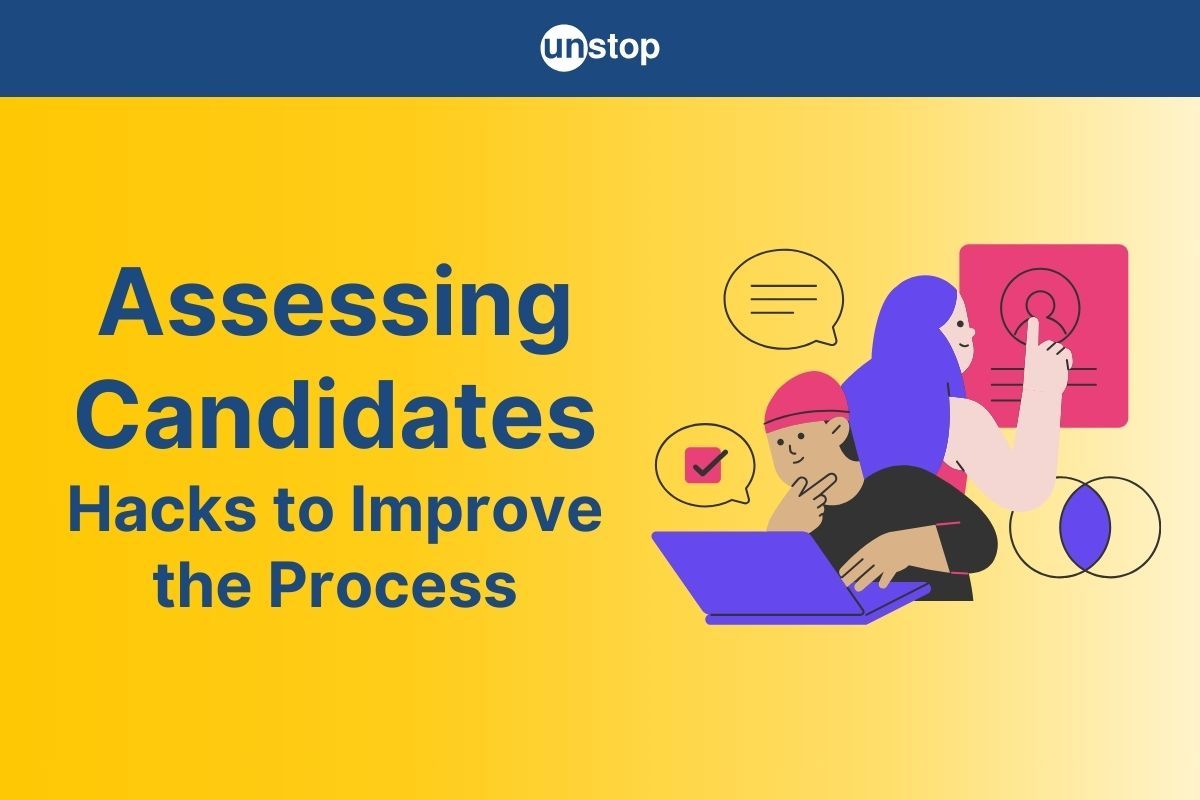
Effectively assessing candidates is crucial for finding the right fit for your team. This is no secret. But how do you go about assessing candidates effectively? From structured interviews to skills assessments, various methods exist to evaluate candidates thoroughly.
As per the Unstop Talent Report 2024, “68% of HRs use a combination of resume screening and skill assessments to initially shortlist candidates.”
By implementing robust assessment strategies, you can identify top talent, reduce turnover rates, and boost overall productivity. Let’s delve into the type of candidate assessments, the skills they help assess, and important hacks that can improve the efficiency of your candidate assessment process.
Overview of Candidate Assessment Tests
Types of Assessments
Candidate assessment tests come in various forms, including exams, interviews, skills assessments, and personality tests. These evaluations help employers gauge a candidate's suitability for a specific role.
The primary purpose of conducting candidate assessments is to evaluate individuals objectively based on their qualifications and competencies.
Importance of Assessments
Assessment tests enable employers to make informed decisions during the hiring process by assessing candidates' suitability for the job role. By combining different tests, employers can comprehensively understand each candidate's potential fit within the organization. This helps ensure the selected candidate aligns with the company's values, culture, and job requirements.
Using assessments in the hiring process offers two critical benefits:
- Enhancing the accuracy of candidate evaluations: By incorporating different assessments, employers can obtain a well-rounded view of each candidate's capabilities and potential contributions to the organization.
- Reducing Bias: Assessments also aid in reducing bias during the selection process by focusing on objective criteria rather than subjective judgments. This leads to fairer evaluations and helps select candidates based on merit and qualifications.

Using Personality Tests
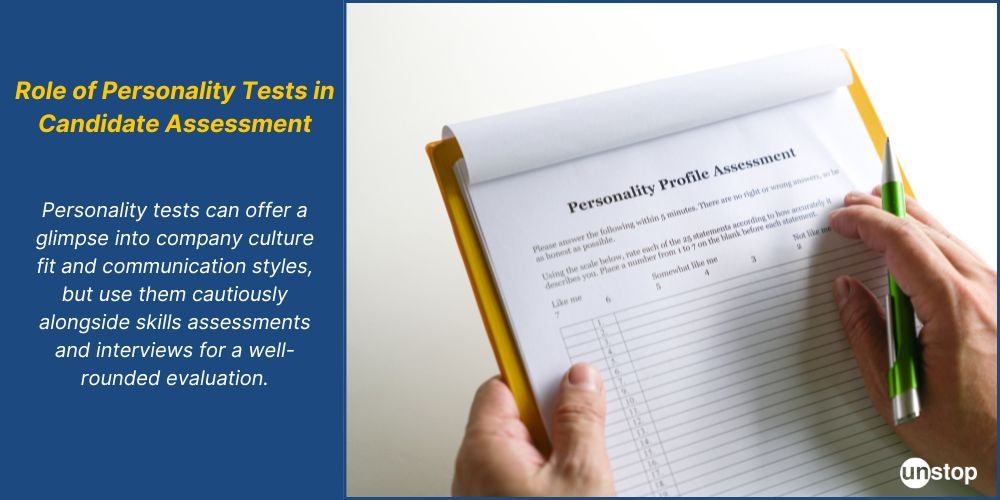
What are Personality or Behavioral Tests?
Personality tests delve into thought processes and behaviors, providing valuable insights into an individual's emotional intelligence and communication style. These tests are instrumental in predicting how candidates will perform in different scenarios within the workplace.
Employers can anticipate how individuals will handle challenges and collaborate with colleagues by assessing traits like adaptability, decision-making skills, and conflict-resolution abilities.
This predictive insight enables businesses to select candidates who align with their organizational culture and values.
Here are some examples of personality and behavioral tests commonly used in candidate assessment:
Personality Tests
- Myers-Briggs Type Indicator (MBTI): This popular questionnaire categorizes individuals based on preferences in four areas: Extraversion (E) vs. Introversion (I), Sensing (S) vs. Intuition (N), Thinking (T) vs. Feeling (F), Judging (J) vs. Perceiving (P).
- DISC Assessment: This framework categorizes personalities based on four traits: Dominance (D), Influence (I), Steadiness (S), and Conscientiousness (C). It helps identify communication styles and behavioral tendencies.
- Big Five Personality Traits: This model assesses personality along five dimensions: Openness to Experience, Conscientiousness, Extraversion, Agreeableness, and Neuroticism (OCEAN).
It's important to note that personality tests can be subjective and may not always be a strong predictor of job performance.
Behavioral Tests
- Situational Judgment Tests (SJTs): These tests present candidates with hypothetical work scenarios and ask them to choose the most appropriate course of action. This assesses their problem-solving skills and decision-making abilities in real-world situations.
- Work Simulation Tests: These tests place candidates in simulated work environments and ask them to complete tasks or solve problems relevant to the job role. This provides a more realistic assessment of their skills and how they might perform in the actual job.
- Behavioral Interviewing: This technique focuses on "tell me about a time" questions that ask candidates to describe past experiences that demonstrate specific skills or behaviors relevant to the job.
Behavioral tests are generally considered more reliable than personality tests for predicting job performance, as they focus on past actions that may indicate future behavior.
Additionally:
- Cognitive Ability Tests: These are a type of aptitude tests that measure a candidate's mental abilities, such as reasoning, problem-solving, and critical thinking. They can be helpful for identifying candidates who have the intellectual capacity to succeed in the role, especially for positions requiring strong analytical skills.
- Integrity Tests: These tests assess a candidate's honesty and ethical values. They might include hypothetical scenarios designed to measure a candidate's propensity for theft, lying, or other unethical behavior.
Technical Skills Testing
Technical skills testing delves into candidates' practical application of their theoretical knowledge. Recruiters can tailor questions to match the specific needs of different roles within the organization. For instance, data scientists may face questions about statistical analysis tools, while software developers may be tested on programming languages and algorithms.
This process helps recruiters pinpoint individuals with the right combination of theoretical understanding and practical proficiency. Employers look for individuals who can think critically, analyze complex issues, and propose effective solutions.
Coding Tests
Programming tests assess candidates' coding skills and knowledge of computer languages. These evaluations typically involve solving questions related to algorithms, data structures, and coding challenges. Candidates are required to provide solutions within a specified time frame.
The focus of these coding assessments is on solution-oriented thinking and software maintenance. Candidates are evaluated based on their ability to identify risks, debug code efficiently, and optimize algorithms for better performance.
Competency Assessment
Competency assessment evaluates domain knowledge, evaluating candidates' expertise in specific subject areas. By assessing their understanding of key concepts and terms, recruiters can gauge the depth of their knowledge. The tests simulate real-world scenarios to gauge the candidates' problem-solving approach.
Unstop conducts technical assessments for variety of domains, like sales, marketing, IT & analytics, Coding, Finance & Accounting, etc. Explore technical assessments on Unstop and improve your hiring process.
Communication Tests
Assessments focusing on communication abilities evaluate how well candidates express their thoughts, actively listen, collaborate effectively with team members and adapt their communication style to different audiences.
These tests provide insights into a candidate's clarity in conveying information and resolving conflicts efficiently.
Verbal Skills
Voice assessments conduct exams to evaluate candidates' verbal skills. These assessments focus on the candidate's ability to articulate thoughts clearly and coherently.
Candidates are required to respond to prompts, engage in conversations, and demonstrate their proficiency in verbal communication. This evaluation method helps recruiters gauge how effectively candidates can express ideas verbally.
Written Communication
Writing assessments play a crucial role in assessing candidates' writing skills. These evaluations typically involve tasks such as composing emails, reports, or essays within a specified time frame.
By analyzing candidates' written responses, recruiters can assess their grammar, vocabulary usage, coherence, and overall writing proficiency. Strong writing skills are essential for effective communication in various professional settings.
Listening Assessments
Listening assessments are vital in determining candidates' comprehension and response skills. Candidates are required to listen to audio clips or live interactions and answer questions based on the content they heard.
These assessments help evaluate how well candidates can understand information presented orally and respond appropriately. Strong listening skills are crucial for effective communication, collaboration, and problem-solving in the workplace.
Using Generative AI in Assessments
Generative AI is a type of artificial intelligence that uses machine learning to create entirely new content, like text, images, or even code. This allows it to be used in candidate assessment for tasks like generating realistic job simulations to evaluate a candidate's skills in a practical setting.
Generative AI can transform candidate assessment by going beyond traditional formats, allowing for a more dynamic and data-driven evaluation compared to static resumes or rote memorization-based tests.
Evaluation of Soft Skills
Generative AI skill tests present candidates with real-world scenarios, requiring them to devise innovative solutions within a limited timeframe. Through this, candidates demonstrate their analytical thinking and creativity. It also gives a front-row view of their problem-solving and communication skills.
Traditionally, recruiters could only evaluate these skills through situation-based questions in an interview. A candidate may be able to explain a situation, but Generative AI allows them to execute it - giving an insight into their thought approach and execution capabilities.
Evaluation of Technical Depth
Generative AI enhances the assessment process by delving into candidates' technical depth. By simulating complex technical challenges, these tests gauge candidates' proficiency in various programming languages and frameworks. This detailed evaluation ensures that candidates possess the necessary technical skills for the role.
Unique Ratings and Feedback
Unlike traditional assessments, which may offer generic feedback, Generative AI provides tailored insights into each candidate's performance. This personalized feedback helps candidates effectively understand their strengths and areas for improvement.
7 Must-Know Tips To Improve Candidate Assessment
These tips are integral to the success of candidate assessment in any industry, and for any role:
- Structured Interviews: Develop a standardized interview format with specific questions to ensure fair and consistent evaluation.
- Behavioral Interviewing: Focus on "tell me about a time" questions to assess past behaviors that predict future performance.
- Reference Checks Done Right: Contact multiple references with well-structured questions to gather a more complete picture of the candidate.
- Utilize Proctoring Measures: Proctoring measures ensure the integrity of the evaluation process and prevent mishires by reducing the risk of hiring individuals who may not have the necessary qualifications or skills for the role. Conduct fair online assessments with Unstop’s AI-enabled Online Proctoring solutions.
- Leverage Generative AI: Explore how AI can create dynamic job simulations or tailor questions to test real-world skills like problem-solving and decision-making.
- Virtual Interviewing Platforms: Virtual interviewing platforms offer a convenient way to administer domain knowledge tests, allowing recruiters to efficiently evaluate candidates' technical skills remotely. Such assessments help identify top talent by screening for proficiency in relevant areas.
- Brand Your Assessments: Candidate assessment is also a branding opportunity. Use assessment platforms that allow you to build branded assessments. For example, Unstop’s assessment platform allows organizations to create a custom-branded, no-code microsite.
- Multi-assessment Format: Utilize a multi-assessment format, i.e. using more than one type of assessment to evaluate a candidate. This provides mutliple data points about a candidate’s skill set, improving hiring efficacy.
Also Read: How quizzing can improve the candidate assessment process.
11 Hacks For Assessing Candidates
Assessing candidates is not just about conducting the assessment in a more effective manner. It’s also about streamlining other parts, including pre-screening, application process and post-screening, to streamline your hiring process:
Assessing Candidates: Pre-screening Hacks
- Targeted Job Descriptions: Use clear, concise language highlighting essential skills and avoiding unnecessary jargon.
- Skills Assessments: Implement online pre-screening assessments to filter out unqualified candidates early on.
- Use What You Have: Collaborate with in-house teams and leverage pre-existing tests, if valid, rather than reinventing the wheel for a new role.
Assessing Candidates: Application Process Hacks
- Streamlined Applications: Design user-friendly application forms that minimize unnecessary fields and allow for easy resume uploads. Or use an Application Tracking System (ATS).
- Video Introductions: Consider incorporating short video introductions for candidates to showcase their communication skills and personality.
- Diversity & Inclusion: Utilize diverse interview panels and blind resume reviews to mitigate unconscious bias.
Assessing Candidates: Post-Assessment Hacks
- Clear Communication: Provide timely feedback to all candidates, regardless of the outcome.
- Utilize Talent Pools: Maintain a database of qualified applicants who might be a good fit for future openings. Or use an assessment platform with an extensive community like Unstop, which has an ever-growing community of over 9 million students and early professionals.
- Candidate Relationship Management (CRM): Implement a CRM system to track candidate interactions and streamline communication.
- Continuous Improvement: Continuous improvement in assessment strategies is essential for making informed hiring decisions. Collect feedback from interviewers and hiring managers to identify areas for enhancement in the recruitment process.
By focusing on these hacks, you can significantly improve the efficiency of your candidate assessment process, saving time and resources while ensuring you attract top talent.
Remember, assessing candidates goes beyond just evaluating technical skills; it delves into their problem-solving abilities, project management proficiency, essential soft skills, and overall fit within the team dynamics. By incorporating a holistic approach to candidate evaluation, you can ensure that you select the best-suited individuals for your organization's success.
For more insights on navigating the current hiring landscape, download the Unstop Talent Report 2024 and find views of all the stakeholders of hiring - students, recruiters and colleges.
Frequently Asked Questions
1. What are the key components of candidate assessment tests?
Candidate assessment tests typically evaluate personality traits, leadership qualities, domain knowledge, technical skills, communication abilities, teamwork skills, problem-solving capabilities, analytical skills, writing proficiency, listening skills, project management expertise, and data analysis aptitude.
2. What are candidate assessment hacks, and why are they important?
Candidate assessment hacks refer to innovative and effective strategies used during the hiring process to assess candidates' skills, competencies, and fit for a role. These hacks are important because they help streamline the hiring process, improve candidate selection accuracy, and ensure the right talent is hired for the job.
3. How does Generative AI enhance the assessment process?
Generative AI plays a crucial role in assessments by providing insights into candidates' responses and behaviors. It can analyze large datasets efficiently to identify patterns and trends that help in predicting candidates' performance accurately.
4. What is the significance of testing domain knowledge and technical skills during candidate evaluations?
Testing domain knowledge ensures candidates have a strong understanding of industry-specific concepts, while assessing technical skills validates their ability to perform tasks essential for the job role effectively.
5. What are some creative ways to assess candidates beyond traditional interviews and resumes?
Some creative ways to assess candidates include:
- Implementing skills-based assessments or simulations to test specific job-related skills.
- Using gamified assessments to evaluate problem-solving, critical thinking, and decision-making abilities.
- Conducting virtual or in-person job auditions where candidates perform tasks similar to those required on the job.
- Utilizing behavioral assessments or personality tests to assess cultural fit and work style preferences.
6. How can technology be leveraged for candidate assessment?
Technology can be leveraged for candidate assessment in various ways:
- Using applicant tracking systems (ATS) to screen resumes efficiently and track candidate progress.
- Implementing video interviewing platforms for remote assessments and asynchronous interviews.
- Utilizing AI-powered tools for automated candidate screening, analysis of candidate responses, and predictive analytics.
- Incorporating online assessment platforms for skills testing, personality assessments, and cognitive abilities.
7. What are some best practices for designing effective candidate assessment processes?
Best practices for designing effective candidate assessment processes include:
- Clearly defining job requirements and success criteria for the role.
- Using a combination of assessment methods tailored to the specific job and candidate profile.
- Involving multiple stakeholders, such as hiring managers, team members, and HR professionals, in designing assessments.
- Providing timely and constructive feedback to candidates to enhance their experience and employer brand.
8. How can candidate assessments contribute to diversity and inclusion initiatives?
Candidate assessments can contribute to diversity and inclusion initiatives by focusing on objective criteria and skills-based evaluations rather than relying solely on subjective interview impressions. Using structured assessments helps minimize bias and ensure fair evaluation of all candidates, promoting diversity in hiring practices.
9. What role does continuous improvement play in candidate assessment processes?
Continuous improvement is essential in candidate assessment processes to optimise hiring outcomes over time. HR teams should regularly review assessment methods, gather stakeholder feedback, analyze hiring data, and incorporate learnings to refine and enhance assessment practices for better candidate selection and retention.
Suggested Reads:
I’m a reader first and a writer second, constantly diving into the world of content. If I’m not writing or reading, I like watching movies and dreaming of a life by the beach.
Login to continue reading
And access exclusive content, personalized recommendations, and career-boosting opportunities.
Subscribe
to our newsletter
Blogs you need to hog!
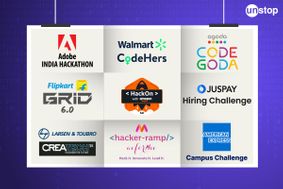
Organize Hackathons: The Ultimate Playbook With Past Case Studies

What is Campus Recruitment? How To Tap The Untapped Talent?
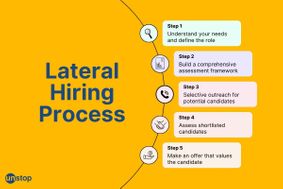
Lateral Hiring: A Complete Guide To The Process, Its Benefits, Challenges & Best Practices
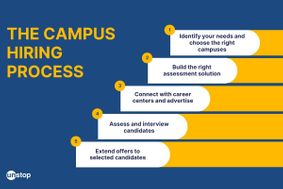
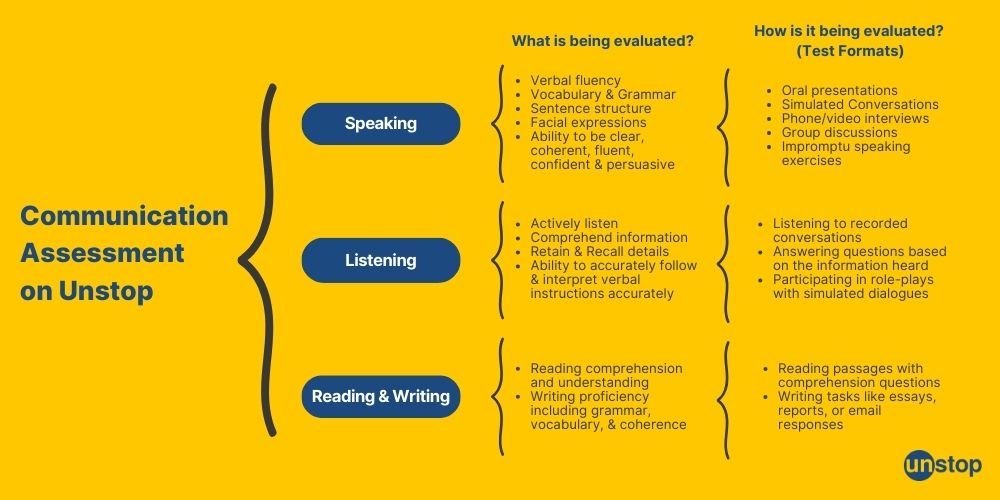










Comments
Add comment